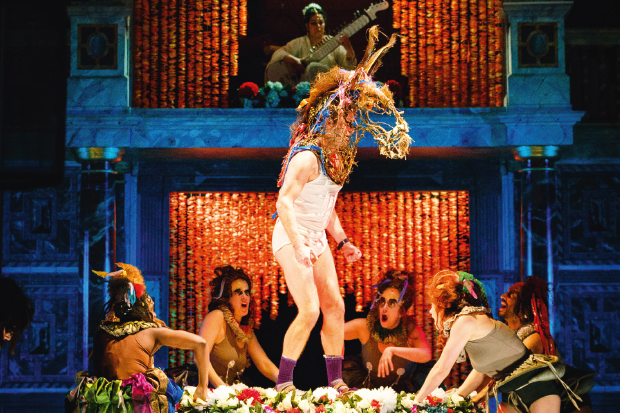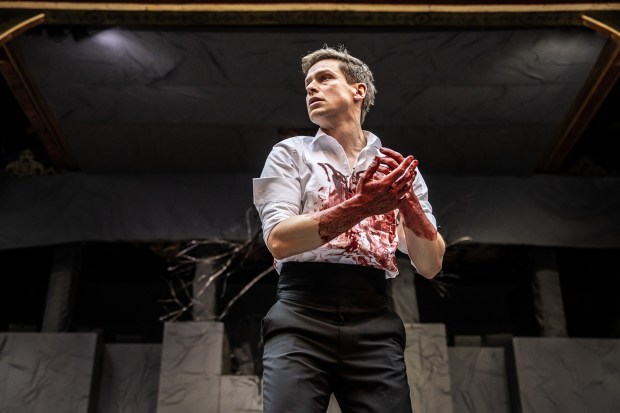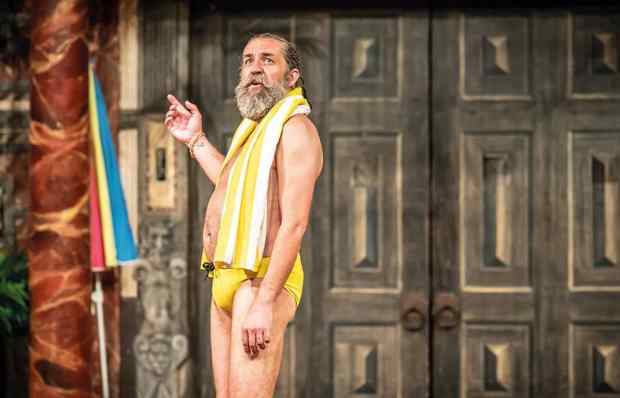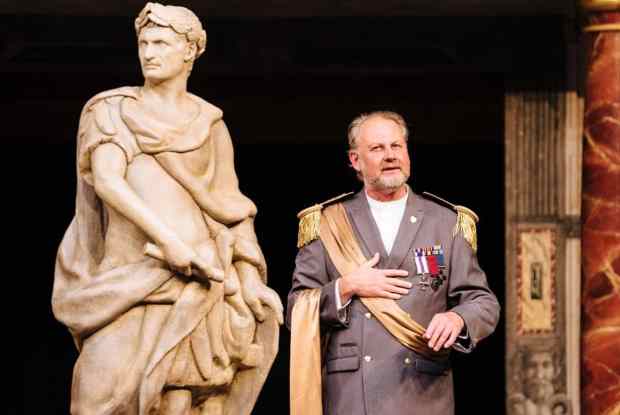The Globe’s new chatelaine, Emma Rice, has certainly shaken the old place up. It’s almost unrecognisable. Huge white plastic orbs dangle overhead amid plunging green chutes like rainforest vines. The back wall is smothered in a blinding rampart of explosively coloured saffron petals. Up top, partially concealed by pillars, lurks a rock band togged up in a blend of Elizabethan casuals and modern gear. Presiding over everything is an Indian matriarch, seated in cross-legged solemnity, playing an electric sitar whose headstock (the bit with the tuning pegs) resembles a Fender bass. What are we supposed to make of this weird, druggy, space-age Bollywood mash-up? Nothing much. Except that Shakespeare belongs now, and then, and here and there, and everywhere. Which comes as a fantastic relief. What a stylish departure from the usual updates, which tend to drag the text, bound and gagged, up some anthropological avenue that turns out to be a dead end.
The show opens with a dig at the Globe’s traditions. A crew of actors dressed as the officious stewards who enforce the theatre’s self-imposed rules barge their way on stage and deliver a ‘Bankside health and safety lecture’. We’re warned of sunstroke (on a cold, cloudy evening), whose dangers are compounded by the fact that the main symptoms — confusion and fatigue — are indistinguishable from the normal human response to a Shakespeare play. Then there’s a fire drill. The groundlings are told to form two wide alleys through which the actors may pass before anyone else can leave the burning building.
And so begins A Midsummer Night’s Dream along with a vibrant score of toe-tapping music that offers a knowing commentary on the text. There are bursts of Bowie and Beyoncé, and snatches of George Formby and Marilyn Monroe, which add delicious feather-light suggestions and illuminations that link our culture with the Elizabethan age. It’s wonderful stuff. The ensemble work, the visual exuberance, and the fun-loving spirit of the piece are astoundingly good. One example. The play features Shakespeare’s deadliest attempt at farce: intoxicated Titania conceives an erotic desire for Bottom, who’s dressed as a donkey. Nothing in this jape enlists our sympathy. We don’t care for the quasi-bestial relationship. We don’t care for Titania’s predicament (because Titania drugged is not Titania). And we don’t care for the donkey because his donkeyishness is a cowardly prank intended to humiliate a helpless woman. And invariably, when the gag falls flat, the players try to compensate with laborious attempts at comedy. But here Shakespeare’s dross becomes good, perky fun.
Bottom is played by the handsome clown, Ewan Wardrop, whose donkey disguise is an intricate fretted head-mask which suggests the outline of an equine skull without obscuring the actor’s attractive face. And he woos Titania with an adroit burst of ukulele music. So he’s talented. Anyone would be drawn to a gifted young chap like this and Titania’s infatuation is transformed from distasteful burlesque into a passage of frisky silliness. All the major roles are done with great inventiveness. Anjana Vasan, in thick NHS specs, has a wonderfully light touch as the put-upon Hermia. Katy Owen is a spry, acrobatic Puck, and Zubin Varla creates an orotund and enjoyably pompous Oberon. Meow Meow, a talented cabaret artist, brings a voluptuous raunchiness to Titania.
What an extraordinary debut for Emma Rice. She admits that before applying for her current post she hadn’t made a great study of Shakespeare. And if this is where ignorance of literature leads then we need it established as the norm in every school in the land. I suspect that Britain’s teachers can, with very little effort, pull this one off.
African drama has a dispiriting tendency to follow binary archetypes. Too often we’re treated to plays featuring noble, wise, peace-loving black rebels held captive by thick, jeering, violent white racists. This new play by May Sumbwanyambe, a Scot, takes a refreshingly balanced approach to the issue of land reclamation. Guy and his family have successfully farmed their Zimbabwean patch for three generations, but the new government wants it back at a knockdown price. A shifty negotiator, Mr Charles, arrives hoping to get Guy to sign the papers. Guy won’t budge. He’s seen other farms destroyed by ‘veterans’ who were merely state-sponsored saboteurs. He insists that the land he owns was stolen from no one. When white settlers arrived in southern Africa they found a depopulated wasteland from which they created wealth, food, employment and stability. Guy’s eloquence and moral toughness are superbly portrayed by the excellent Peter Guinness. And Stefan Adegbola is teasingly mercurial as the negotiator who has a tragedy of his own to conceal.
This is a hugely impressive attempt to give a grand theme the treatment it deserves. More and better will come from this writer.
Got something to add? Join the discussion and comment below.
Get 10 issues for just $10
Subscribe to The Spectator Australia today for the next 10 magazine issues, plus full online access, for just $10.
You might disagree with half of it, but you’ll enjoy reading all of it. Try your first month for free, then just $2 a week for the remainder of your first year.














Comments
Don't miss out
Join the conversation with other Spectator Australia readers. Subscribe to leave a comment.
SUBSCRIBEAlready a subscriber? Log in